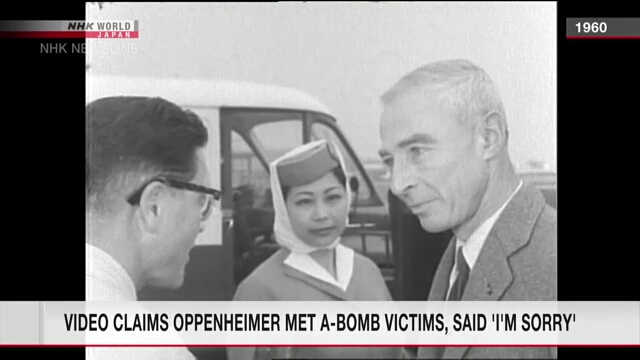June 20, Hiroshima — NHK has uncovered newly found video footage in Hiroshima City, revealing that J. Robert Oppenheimer, the theoretical physicist who led the development of the atomic bomb, apologized to survivors of the Hiroshima and Nagasaki bombings 60 years ago.
NHK has learned of new video footage found in Hiroshima City of an interpreter testifying that J. Robert Oppenheimer shed tears as he said “I’m sorry” to atomic bomb survivors 60 years ago.#Oppenheimer reportedly said ‘I’m sorry’ to A-bomb survivorshttps://t.co/dxD93Ra9pu
— こたママ kotamama (@kotamama318) June 24, 2024
The footage features an interpreter, Teichler Yoko, speaking in 2015 about a visit to the US in 1964 by atomic bomb survivors, known as hibakusha. Teichler recounts a closed-door meeting between Oppenheimer and Shono Naomi, a Hiroshima-born hibakusha and fellow theoretical physicist, along with other Japanese visitors.
According to Teichler, Oppenheimer was visibly emotional during the meeting. “He already had tears streaming down his face and he repeatedly said ‘I’m sorry’,” she recalls. This encounter, documented by Shono in his high school alumni newsletter, highlights Oppenheimer’s deep remorse and the burden he carried regarding the bombings.
Oppenheimer, who never visited Hiroshima or Nagasaki, expressed his reluctance to discuss the bombings, indicating the profound impact these events had on him. His meeting with the hibakusha, although not widely known, holds significant emotional weight for the survivors.
Miyamoto Yuki, a professor at DePaul University in Chicago, emphasized the importance of this revelation. “It is surprising — and hugely significant for the hibakusha — that Oppenheimer actually met them and said sorry,” she noted. Many survivors had hoped that Oppenheimer would champion the abolition of nuclear weapons, but he did not pursue this cause before his death in 1967. Miyamoto acknowledges the challenge of abolishing nuclear weapons, stressing the need to bridge the gap between Oppenheimer’s words and reality through collective action.






